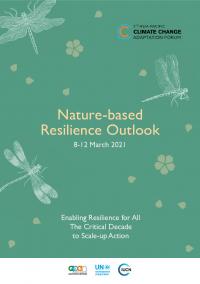Nature-based Solutions for Accelerating Climate Change Adaptation – Challenges and Possibilities for the Asia-Pacific
- English
- Biodiversity, Climate Change
Nature-based Solutions (NbS) are becoming a critical component of the agenda within local, national and international policy processes. As an umbrella term covering ideas about working with nature for societal benefit, NbS have strategic potential to bridge the fast-converging agendas of the climate crisis, biodiversity conservation and the Sustainable Development Goals. This session discusses recent developments and the strategic stakes of NbS with a focus on climate change adaptation and resilience. It will also set the scene by discussing the current status of research and policy on NbS from the perspective of adaptation and resilience. The discussion will also consider the transformative potential of NbS through a review of critical issues, including strategies to realise its multiple benefits, financing through development projects such as infrastructure, and potential challenges or shortcomings in implementation on the ground. Specific insights can be drawn from a research project on mangrove ecosystem services in Asia-Pacific countries, funded by the Asia-Pacific Network for Global Change Research, with the purpose of seeing the potential of NbS in the Asia-Pacific. These debates will feed into an initiative by the Adaptation and Water Unit at IGES, looking at the nexus between NbS and climate change adaptation by building capacity development programmes to strengthen NbS. The session will identify strategic areas of investigation for the Asia-Pacific Climate Change Adaptation Information Platform (AP-PLAT) to become a platform that integrates NbS, climate change adaptation and sustainable development in the Asia-Pacific region.
Senior Policy Researcher, Integrated Sustainability Centre(Specialist in Landscape Ecology and Planning), IGES

Rajarshi Dasgupta
Senior Policy Researcher, Integrated Sustainability Centre(Specialist in Landscape Ecology and Planning), IGES
Dr. Rajarshi Dasgupta received his Ph.D. from Kyoto University and is presently working as a senior policy researcher at the Integrated Sustainability Centre of IGES. His research interests are risk-sensitive land use planning, Ecosystem-based Disaster Risk Reduction (Eco-DRR), socio-environmental scenario planning, participatory conservation, and disaster risk management. He has served as a Lead Author (LA) for several recent Intergovernmental Science-Policy Platform for Biodiversity and Ecosystem Services (IPBES) assessments. Besides he has authored over 50 peer-reviewed journal papers in reputed international journals and edited several books. He is an editor with multiple reputed international journals, including Sustainability Science (Springer) and Anthropocene Science (Springer). His most recent book is on Blue-Green Infrastructure across Asian Countries: Improving Urban Resilience and Sustainability (Springer).
Professor of Plant Ecology, Institute of Biological Sciences, University of the Philippines, Los Baños College

Damasa M. Macandog
Professor of Plant Ecology, Institute of Biological Sciences, University of the Philippines, Los Baños College
Prof. Macandog is a Professor of Plant Ecology teaching courses on Plant Ecology, Principles of Ecology, Quantitative Ecology, Ecosystem Services and Climate Change, Earth Science, and Biology. She serves as adviser to Biology, Botany and Environmental Science undergraduate and graduate students supervising their research activities.
She is actively involved in research and provides leadership to multidisciplinary research teams. Her research interests include land use change and its impacts on biodiversity and hydrologic balance; biodiversity information system; climate change and environmental risk assessment; recreational and aquaculture carrying capacity of freshwater lakes, mangrove ecosystem services in coastal hazard mitigation, developing climate decision-support framework, water and nutrient dynamics in indigenous muyong-payoh systems, marine plastic litter, and sustainability of agricultural and agroforestry production systems.
IUCN Asia, Senior Programme Officer, Water and Wetlands

Raphael Glemet
IUCN Asia, Senior Programme Officer, Water and Wetlands
Raphael Glemet is Senior Programme Officer for Water and Wetlands at the IUCN Asia Regional Office in Bangkok, as well as regional focal point for Nature Based Solutions, the UNFCCC and the Ramsar Convention. He holds a MS in Wetlands Management and Engineering (University of Angers, France). He has fourteen years of experience working on environmental conservation with governments, INGOs, and intergovernmental organisations, covering a range of topics including water and transboundary cooperation, wetlands management, coastal ecosystems, fisheries and nature based solutions for resilience.







